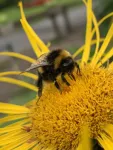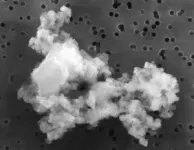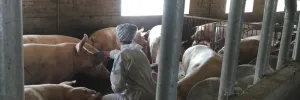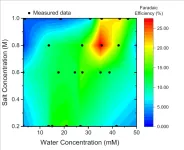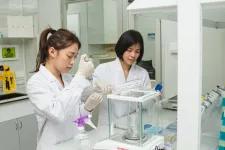(Press-News.org) Temperature influences how badly pesticides affect bees’ behaviour, suggesting uncertain impacts under climate change, according to a new study.
The findings indicate that future extreme temperature events under climate change could increase the impact of pesticides on bee populations and their pollination services.
Certain pesticides, particularly a class called neonicotinoids, are known to impact bees and other important insects, and are thought to be contributing to population declines. However, bees’ reported responses to this threat across the world often seem to vary, suggesting other interacting factors are at play.
Now, researchers from Imperial College London have shown that environmental temperature can influence the degree to which pesticides can alter a suite of bumblebee behaviours important for their survival and ability to pollinate crops. The study is published today in Global Change Biology.
Pesticide effects on flight under heat waves
The team studied six bumblebee behaviours under the influence of two pesticides (the neonicotinoid imidacloprid and the sulfoximine sulfoxaflor) at three temperatures (21, 27 and 30°C).
Four of the behaviours – responsiveness, likelihood of movement, walking rate, and food consumption rate – were affected by imidacloprid more strongly at the lower temperature. This suggests cold snaps could increase pesticide toxicity on behaviours important for nest duties.
However, a key behaviour – how far the bees could fly– was most strongly affected by imidacloprid at the highest temperature. This relationship showed a strong drop-off, with flight distance measuring the same between 21 and 27°C, before falling sharply when reaching 30°C.
Lead researcher Dr Richard Gill, from the Department of Life Sciences (Silwood Park) at Imperial, said: “The drop-off in flight performance at the highest temperature suggests a ‘tipping point’ has been reached in the bees’ ability to tolerate the combined temperature and pesticide exposure. This seeming cliff-edge effect happens over the span of just three degrees, which changes our perception of pesticide risk dynamics given such temperature changes can commonly occur over the space of a day.
“Furthermore, the frequency to which bees will be exposed to pesticides and extreme temperatures under climate change are predicted to increase. Our work can help to inform the right concentrations and application times of pesticides across different climatic regions of the world to help safeguard pollinators, such as bees.”
Pollination problems
Flight distance is key for pollination, as it underpins foraging potential and contributes to food security through crop pollination.
Although the tropics are hotter in general, it is possible that insect pollinator populations in the more temperate latitudes, including the UK, feel pesticide effects more strongly, as the temperature ranges are larger.
Bees are responsible for pollinating many important cereal crops as well as legumes and fruit trees. As we diversify our food supply, demand for their pollination services will increase – but so may the stresses bees face, from climate change and increased insecticide use.
This work quantifying the relationships between temperature and pesticide impact should help towards modelling the risks of pesticides across different regions of the world as the climate shifts, say the researchers. First author Daniel Kenna, from the Department of Life Sciences (Silwood Park) at Imperial, said: “Our findings show that environmental context is crucial when assessing pesticide toxicity, particularly when projecting bee responses under future climate change.”
Co-author Dr Peter Graystock, from the Department of Life Sciences (Silwood Park) at Imperial, said: “These results are important for developing a toxicity forecast framework, allowing us to predict how bee populations will respond to climate change whilst living in intense agricultural landscapes.”
The team next want to do more comprehensive studies across the temperature gradient to determine how toxicity effects scale with temperature, and precisely where tipping points may lie across a range of species.
END
Changing temperatures increase pesticide risk to bees
2023-03-22
ELSE PRESS RELEASES FROM THIS DATE:
Research reveals substantial human cost of international COVID-19 travel and border restrictions
2023-03-22
Findings paint a bleak picture of little or no financial and health support from governments for their citizens stuck overseas.
At least two-thirds of those stranded aboard experienced financial distress and moderate-to-severe levels of depression—a rate that is substantially higher than the general population and health care professionals in the pandemic.
**Note: the release below is a special early release from the European Congress of Clinical Microbiology & Infectious Diseases (ECCMID 2023, Copenhagen, 15-18 April). Please credit the congress if you use this story**
**Note – the press release is available in Spanish and ...
TMAC helping businesses prevent pollution
2023-03-22
The University of Texas at Arlington-based Texas Manufacturing Assistance Center (TMAC) has received a grant worth nearly $500,000 to assist manufacturers in developing and adopting pollution prevention practices that reduce costs and environmental impacts.
The $498,836 grant from the Environmental Protection Agency’s Pollution Prevention Program allows both the TMAC Sustainability team and Process Automation Design Engineering (PADE) team to work with manufacturers to prevent pollution in areas considered environmental justice regions. An environmental ...
Early career honor for Wang
2023-03-22
A University of Texas at Arlington researcher is working to optimize supply chain management to allow for flexibility from forces outside the supply chain, such as policy changes that can cause major disruptions.
Linda Wang, assistant professor in the Mechanical and Aerospace Engineering Department at UTA, has earned a five-year, $503,000 Faculty Early Career Development Program (CAREER) grant from the National Science Foundation (NSF) for her research. CAREER awards are the NSF’s most prestigious honor for early-career ...
New animal welfare scoring system could enable better-informed food and farming choices
2023-03-22
Cambridge University scientists have come up with a system of measuring animal welfare that enables reliable comparison across different types of pig farming.
This means that animal welfare can now, for the first time, be properly considered alongside other impacts of farming to help identify which farming systems are best.
This is vital for improving animal welfare in livestock production, at a time when demand for meat is rising globally and the way animals are farmed is changing - with concerns about the welfare of intensive and indoor systems.
Animal welfare assessments could also enable consumers to be better informed when choosing what to eat.
Britain ...
Science journals update guidelines after study highlights incomplete reporting of research
2023-03-22
Several scientific journals have amended their submission guidelines after an analysis identified numerous research studies that had been published with crucial information missing.
The finding emerged from an analysis by academics at the University of Cambridge, which reviewed reports from trials evaluating new school-based programmes to increase the amount of children’s physical exercise. It found that 98% of these reports left out key details about how teachers had been trained to deliver the interventions.
The trial reports ...
Study shows ‘obesity paradox’ does not exist: waist-to-height ratio is a better indicator of outcomes in patients with heart failure than BMI
2023-03-22
New research has debunked the idea that there is an “obesity paradox”, whereby patients with heart failure who are overweight or obese are thought to be less likely to end up in hospital or die than people of normal weight.
The study, which is published in the European Heart Journal [1] today (Wednesday), shows that if doctors measure the ratio of waist to height of their patients, rather than looking at their body mass index (BMI), the supposed survival advantage for people with a BMI of 25kg/m2 or more disappears.
The “obesity paradox” relates to counter-intuitive findings suggesting that, although people are at greater risk of developing ...
The devil is in the details: Re-imagining fertilizer precursor synthesis
2023-03-22
Osaka, Japan – The Haber–Bosch reaction helps feed the world by converting nitrogen into ammonia, a fertilizer precursor. However, its carbon footprint is huge: this one reaction is the source of nearly 2% of global carbon emissions. Now, in a study recently published in ACS Energy Letters, researchers from Osaka University have helped re-imagine this reaction to improve the sustainability of the chemical industry.
Replacing the Haber–Bosch reaction with a more sustainable alternative has been an active area of research for many years. These efforts have led to a globally well-established electrochemical reaction for ammonia ...
Unmasking the secret of broadly neutralising COVID-19 therapeutic antibodies
2023-03-22
The rapid evolution and emergence of new SARS-CoV-2 variants, such as the Omicron variant, renders it highly capable of evading the host immunity.
At the same time, vaccines based on original wild-type strain of SARS CoV-2 shows reduced protection against newer variants, particularly for the Omicron variant. This results in break-through infections among those vaccinated and highly infectious among non-vaccinated individuals.
Thus, it remains uncertain whether new emerging variants of the COVID-19 disease can escape the protective immune response ...
BetaLife and A*STAR Collaborate to develop next generation cell-based therapy for diabetes treatment
2023-03-22
Up-and-coming local biotech startup BetaLife Pte Ltd (“BetaLife”) is collaborating with the Agency for Science, Technology and Research (A*STAR) to accelerate the development of next generation cell-based therapy for diabetes. BetaLife, a stem cell therapy company focused on developing regenerative medicine for diabetes, has acquired the rights to human induced Pluripotent Stem Cell (iPSC) technology from A*STAR. This technology enables the generation of iPSCs, which are cells that have similar properties to embryonic ...
Endangered vulture returns to Bulgaria after being extinct for 36 years
2023-03-22
The Cinereous Vulture (Aegypius monachus) - also known as Black Vulture, Monk Vulture or Eurasian Black Vulture - is the largest bird of prey in Europe.
Globally classified as Near Threatened, its populations in southern Europe, once abundant, have been experiencing a dramatic decline since the late 1800s. So dramatic, in fact, that by the mid-1900s, these birds had already been nowhere to be seen throughout most of their distributional range across the Old Continent. In Bulgaria, the species has been considered locally extinct since 1985.
Thanks to the re-introduction initiative that was started in 2015 by three Bulgarian non-governmental organisations: ...
